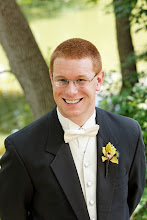Some great comments, ideas, insights and rebuttals! As someone mentioned recently, I believe in person, but maybe somewhere on the interweb, it's fun having a rebirth of the Xanga crew plus new blood. Hurah for the interweb!
Megan, your call for more Christians to be involved in the foster care world is amazing. It's amazing not just because small children are part of the voiceless 'poor and oppressed' that cannot speak for themselves, but also because your call comes out of a lived conviction. For those of you who don't know, I'm adopted. I was adopted at birth and lived with foster parents for the first 10 weeks of my life. I often thank God for their care for me and I know my parents and I are ever grateful for them. However, my adoption circumstances weren't the average. Foster care is important also for the children who are taken from their parents or given up by their parents after birth. I believe that one area that Christians need to really think a lot about is how we can be involved in the WHOLE of beginning and end of life care. Not just, "Abortion and euthanasia are bad", but a presence with people of support and love like the Bensons have been for their foster kids.
I found the ideas attending a local church interesting, mostly because that wasn't what I was thinking directly. I do agree that it would be great for more people to attend and become a part of churches closer to them, not driving past 25 churches to attend the 'right' one for them. However, I think it is more important that individual Christians be involved in their own neighborhood personally and that churches be involved in their local neighborhoods as a 'parish'. If you happen to attend a church outside your neighborhood, for whatever reason, then we know that people are still being cared for. This way, too, I can help network my church that I attend and my local church that I see working in my neighborhood together to learn from one another on how best to serve in certain ways.
Check out Melissa's blog. Not only do I want you to check it out so her Analytics tells her that people got to her site via jesusandlife, but also because she has a great post about churches networking together and working with one another to meet needs. Interesting thoughts that need to be discussed.
Really, when it comes down to it, I want to see Christians and churches in America be more active in their communities. Period. Let's just start there, since it really isn't being done all that much. Preaching on Sunday is great, but let's also start helping people around us.
peace,
Tuesday, September 22, 2009
Subscribe to:
Post Comments (Atom)

3 comments:
OK, Devin. It's been a while since I left my e-tracks here, and you keep goading me with topic choices and references to Jesus'--ahem, I mean "Liberation"--theology. So, at the risk of being terribly wrong, here goes...
First of all, I love Liberation Theology. It's a bit antiquated, I admit, but its influence has changed our own Evangelicalism for the better: More attention to the relationship between Gospel and poverty, and increased emphasis on the local transformational work that is part of the ministry of the local church (liberationists call these "ecclesial communities").
Second, I am less concerned with whether individual Christians are "active" in their local churches, and more concerned that, as Devin put it, churches learn to function like parishes--vessels of divine grace in their particular locales. This means they need to know how to assess community needs and discover where God is asking them to be present in the community. According to the Bible, this is usually with those who are poor, outcast, and all those other categories we give to people we don't like. I believe that if churches are faithful in this task of discernment and presence, God will provide the "active" individuals to work the fields.
Third, I have no illusions about changing the world. It is God's reign and God will bring it. I can only testify to its reality through my actions, since, of course, it's already here.
Fourth, I don't care (very much) about Communists or Free-Market Capitalists or Liberals or liberalism or Conservatives or Fox News or whatever other ridiculous ideological propaganda is mustered up in the name of "good" vs. "evil." I am further convinced every day that the people of God are most at home in exile--outside the center of society and the powerplays of its lifestyle. Constantine died a long time ago; time to kill his theology.
Well, these thoughts are inadequate, but already too long. I guess I need my own blog. Devin, I love the thoughts--keep 'em coming.
I'm digging all the new conversations! Encouraging and inspiring. Keep it up.
Isn't all theology, political philosophy, and really everything worth knowing based on the ideas of dead people? Except for Jesus of course.
I'm the last person to try to play theologian, but isn't life in a state of a exile the consequence of sin? And isn't there a lot of really good theology based on the idea that God's people, like civilization itself, progress? From clans to cultures and from fields to cities? Isn't heaven described as a city? Isn't "the Kingdom of God", well, a kingdom?
Also, "not caring very much" about politics and economics is fine, except that you can't make a statement like "I love Liberation Theology" and also be apathetic about these institutions that are intertwined with that theology. We don't need Liberation Theology to know that Jesus loved poor people. Come to think of it, we don't need Liberation Theology at all. What we need are Christians who are courageous enough to fight for their values to influence culture, because culture is a vehicle for social transformation.
Post a Comment